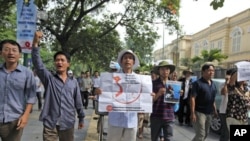Southeast Asian foreign ministers were urged to speed up talks with China on a binding code of conduct for the South China Sea at the start of their annual gathering in Bali Tuesday.
Indonesian President Susilo Bambang Yudhoyono delivered the keynote address to open the Association of Southeast Asian Nations ministerial meeting.
Yudhoyono noted it has been nine years since ASEAN and China agreed in principle to negotiate a binding agreement to settle disputes caused by overlapping territorial claims in the oil- and gas-rich waterway. He said things "do not necessarily have to be this slow."
Tensions over the sea have spiked in recent months as nations step up oil exploration, especially near the Spratly islands which are claimed in whole or part by six governments. Yudhoyono said progress on a code of conduct would send a strong signal to the world that the region's future is "predictable, manageable and optimistic."
ASEAN officials are expected to hold their first direct talks with China on Wednesday, ahead of a meeting on Thursday in which the 10 ASEAN ministers will be joined by their counterparts from China, Japan and South Korea.
On Saturday, the core group will be joined by representatives from 17 other nations, including the United States and Russia, for the ASEAN Regional Forum.
The South China Sea issue was pushed to the top of this year's agenda by a series of incidents in which the Philippines and Vietnam -- both ASEAN members -- complained of Chinese actions in what they claim as their exclusive economic zones. Both complained in particular of interference with oil exploration activities.
China and Taiwan both claim virtually the whole South China Sea, while Vietnam, the Philippines, Malaysia and Brunei claim parts of it adjacent to their shores. China has said it prefers to deal with the disputes on a one-to-one basis rather than negotiating multilaterally.
Other issues expected to come up during this week's meetings include a border dispute between Thailand and Cambodia, North Korea's nuclear weapons program and ASEAN's declared goal of establishing a united economic community by 2015.
There may also be discussion about Burma's bid to serve as ASEAN chairman in 2014.




